TO A FORCE THAT
DIFFERENCE
A CARRER IN THE CIVIL SERVICE
LEAVING THE POLICE
FIRE SAFETY











Older and younger generations have suffered the effects of ageism in the workplace, those that sit within older age groups seem to have borne the brunt of this harmful way of thinking in recent years.

We’re actively working towards creating a workforce that reflects
the communities we serve and is a place where people feel valued and respected.
The Bricks and Mortar of Education.


Has your work in the Police Force triggered your interest in law?
If you are looking for a new career, have you considered re-training to become a residential surveyor?
There is currently an abundance of career opportunities within fire risk assessment industry and with the release of the Fire Sector Federation.
38 TAKE COMMAND OF YOUR RESETTLEMENT WITH SCREEN RESCUE Own and operate a trusted and valued business in the Commercial Automotive Industry with an awardwinning Screen Rescue Franchise.
Located on the picturesque Monmouth Beach in stunning Lyme Regis, Dorset, the worldrenowned Boat Building Academy has been training men and women to build boats to the highest standard for over 25 years.

The services recruit, train, develop and employ people in roles that are demanding, physically and mentally challenging, occasionally traumatising and frequently in austere conditions and/or environments. HOW TO KICKSTART A CAREER IN TRAVEL

Some of the UK’s most successful travel consultants are former police men and women. Find out how they switched careers and how you could do it too.
It’s a big job but satisfying, and it offers a variety of equally satisfying, and exciting career opportunities.
Stuck in a rut, thinking about resettlement or just wanting to advance your career?

©Shutterstcok.com
EDITOR:
James Atkins
E: James@policeresettlement.com
DESIGNER: Rowena Wilson
E: rowenawilsondesign@gmail.com
SENIOR SALES EXECUTIVE: James Atkins
E: james@policeresettlement.com T: 01733 205 938
Ruth Fiddler
E: darren@lancemedia.co.uk
E: jayne@lancemedia.co.uk
E: ken@lancemedia.co.uk
E: emma@lancemedia.co.uk
MICROPRESS LTD
Reydon Business Park, Fountain Way, Reydon, Southwold, IP18 6SZ
For queries regarding your subscription to Police Resettlement please contact: www.policeresettlement. com/subscribe
T: 01536
This
In every issue we aim to bring you opportunities for those looking at career progression or transferring to other forces, as well as highlighting training and employment opportunities for those of you considering leaving the Police force or about to retire.

Our Autumn issue is back after a two year break due to the Covid pandemic and restrictions, we are very pleased to be able to once again bring you numerous opportunities, including transferees from other forces, career progression, training and various franchises that are being featured in this issue.
We hope you will once again enjoy reading the hard copies that are freely available in the parade rooms, canteens and at the front desks, additionally you can read each issue on your Police Intranets or online, where you can also download back issues to your desktop.

To ensure that you never miss any future issues, you can subscribe for free online and have Police Resettlement Magazine sent to your email address as a PDF by visiting www.policeresettlement. com/subscribe with only your name and email address being required to subscribe.
Our social media groups are still available and we hope you will help us to start growing our subscribers and followers, we appreciate all your comments, shares, likes and tweets that we previously received, so please keep spreading the word about the magazine and let us know what you would like to read about in future issues.
We will be attending the Security Cleared Jobs and Police Resettlement Expo at the QE11 Conference Centre in Westminster, London on the 1st November 2022. You can still register for free to attend the event by visiting www.policeresettlementexpo. com. Please come along and speak with members of our team who will appreciate your comments about the magazine.
Police Resettlement magazines are free of charge and designed to assist you all with career development whilst still serving, as well as gaining crucial transitional support and advice when finally leaving service. Our advertisers are carefully selected to ensure they make your transition back to civilian life an easy one, please be sure to mention our magazine when contacting them as without them none of this is possible.
We hope you enjoy reading this issue and look forward to welcoming you to our groups on social media and becoming a subscriber to our digital copies.
If you would like to advertise or contribute to the magazine please call Emma on 01536 334221 or email James@ policeresettlement.co.uk
@PoliceResetMag Like our Facebook page www.facebook.com/ PoliceResetMag / or join our LinkedIn group www.linkedin.com/ groups/8422367 or search for Police Resettlement Magazine
And retention is a problem too, with figures revealing that around 994,000 individuals moved jobs between January and March 2022 in the UK. This shows that businesses are not putting enough effort into retaining their workforce, making them feel valued and presenting them with a path for future progression.
The ageism trend has only been accelerated by the repercussions of Covid-19. After the pandemic, Baby Boomers and a significant portion of Gen X took early retirement, deciding against returning to fulltime work due to the shortage of opportunities available to them.
With individuals over 50 leaving work due to lack of support having been identified as the biggest cause for labour shortage across the UK, ageism has the potential to have a detrimental impact that extends far beyond the damage to individuals and businesses.
Here, David Bernard, founder and CEO of behavioural assessment firm AssessFirst discusses ageism within recruitment practices, sharing valuable insight into the negative impact it is likely to have on the market if we don’t make necessary changes.
Hiring managers’ bias towards employing older individuals has been known to be one of the main causes of ageism within recruitment, and with only 24% of HR leaders between the ages of 25 and 30 saying they felt motivated to recruit workers in the 55 to 75 age category, younger generations’ preconceptions seem to be one of the main problems.

The new generations’ bias is causing them to miss out on the plethora of benefits that working hand-in-hand with people of different ages can have, but also contributing to existing issues within the recruitment industry.
The recruitment crisis is still rampant in the UK, as the number of unfilled positions has risen to a new record of 1,300,000 between March and May 2022, up from 1.295,000 in the February and April quarter.
Additionally, if we are only willing to offer employment to the younger generations, older age groups will naturally feel there are no longer any opportunities available to them, opting for early retirement instead, which is likely to cause the recruitment crisis to become worse in the next few years.
The implications of ageist hiring practices are multi-faceted, but their effects have undoubtedly been felt by many jobseekers within older age groups.
A research project investigating ageism in recruitment in the UK revealed that around 30% of individuals between the ages of 50 and 69 felt the application process itself put them at a disadvantage because of their age, while around 23% of those who participated said that it is the way that job adverts are written and marketed that is particularly problematic.
These findings provide interesting food for thought for recruiters: biased screening processes and job descriptions could easily put off certain individuals from applying for a job, causing businesses to lose a potentially perfect candidate. For instance, hiring processes that are entirely digital or that require the use technology older individuals may not be familiar with would naturally penalise older applicants.
Evaluating the efficacy of their recruitment practices should be the first step for hiring managers and talent acquisition teams, particularly establishing whether these include any elements or processes that would ostracise certain individuals.
If an organisation has built teams predominantly comprising younger individuals, they should consider asking themselves whether they have – consciously or subconsciously – avoided hiring those within older age groups, and why.
While having three or four different generations within the workplace may potentially lead to some minor generational clashes, it also has the potential to be beneficial for all age groups, which is why businesses should empower individuals of different ages to work together.
This should involve utilising behavioural science to identify key traits in individuals to establish whether they will be able to work well together, regardless of age. Knowing exactly how workers collaborate with other individuals, manage stress or react to change are all factors that can help hiring managers make the right decisions and avoid age bias.
Hiring managers should first and foremost establish what individuals’ abilities are, how they behave in different situations and what sets them in motion. AssessFirst’s Talent Mapper provides this information by grouping individuals onto behavioural maps based on these principles, giving them an accurate prediction of how they will work together.
While there is no one answer for every business, our focus should be on making hiring practices as inclusive as possible, which starts with making decisions based on data and focusing on skills and qualities that truly matter.
Ultimately, biased hiring practices are exacerbating the labour shortage and causing businesses to miss out on a huge portion of talented workers capable of really making a difference.
For more information on building data-led recruitment processes, please visit: www.assessfirst.com
While both older and younger generations have suffered the effects of ageism in the workplace, those that sit within older age groups seem to have borne the brunt of this harmful way of thinking in recent years.



Here at Essex Police, our detectives are rewarded and valued for what they do, day in, day out. If you want a force that values difference, Essex Police could be the place for you.
Meet Detective Inspector Tony Atkin who joined policing at the age of 19-years-old. Now, more than 20 years later, Tony is part of our Essex Police family. He said:
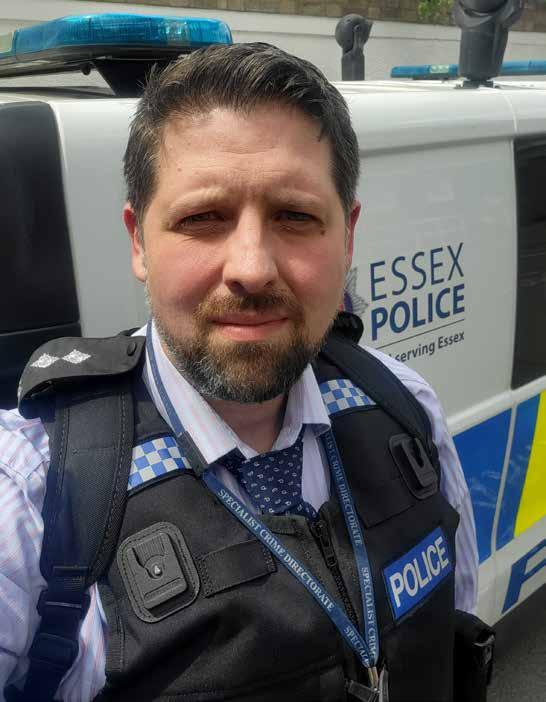
“I loved being a police officer and the variety of teams I worked in, such as child protection and child homicide. I worked on the Jimmy Savile investigation from 2012 to 2017 and I was a case officer for the Rolf Harris investigation. I also pioneered the paperless working that we introduced into our major investigation rooms in the Metropolitan Police.
“Having gone through and passed the promotion processes in both the Met and Essex, I decided I wanted a new challenge. Having worked in the departments I had aspired to be in, I felt that the Met no longer offered that challenge.
“I was told I would be unable to stay in the role I had been temporarily promoted to, and positions available to me as a detective inspector in the Met meant increased travel to and from work, on top of 12-to-14-hour days. I needed a better work life balance, which Essex could offer.
“At Essex Police, the transfer process ran smoothly, and I received around 35 emails from the team about support, meetings and briefings.
“Everything was so personable.” Since transferring to Essex Police, Tony has felt “valued”, and by his 20 years and two months, Tony “needed a new challenge”. Essex Police has been able to provide just that.
“Coming to Essex has rejuvenated me. I certainly got that spark that I had at 19 when I first joined policing. Having that variety of where I work now has been an eye opener.
Not only has Tony gained family at Essex Police, he’s also been given
the opportunity to be closer to his own family. It was his family that inspired him to become a detective, and at one point in his career, he was able to work with his uncle, who is now a retired detective superintendent.
“What I lost in London waiting; I have regained in family time. I now live closer to work, I can see my son more, as well as having the opportunity to work from home. I wouldn’t be able to do that before .”
We also provide succession planning, which means you have “involvement from your line manager” and you feel that sense of “reward”.
“The opportunity for promotion is bigger. There’s a lot of support here. I never received that support before outside of my team.
“There is a misconception in London that because Essex is a smaller force it limits the opportunities you have. That’s wrong. The opportunities are there in any force if you want them and if you work for them.”
Before you head over and click the transfer button, or if you’re still not sure whether this is the right move for you, Tony has some final bits of advice to share:
“Always speak to people that have done it before. I did everything I wanted to do in my last force and wanted a new challenge which Essex could provide.
“Despite there being a quarter of resources here, I still see the good work and achievements that Essex Police can do.
“I’m proud to be part of this force with what we’re able to achieve on a day-to-day basis.”
If you’ve completed your probationary period and served with another force at any rank, then we’d like to hear from you. If you are interested in joining us as a transferee, please register with us by completing our form at www.essex. police.uk/transfer and a member of our team will be in touch. Alternatively, you can contact us directly at corporate. recruitment.essex@essex. pnn.police.uk or on 01245 452234 for more information. We value you and your skills – use them to protect and serve Essex.
 Autumn 2022 Police Resettlement
Autumn 2022 Police Resettlement
rejuvenatedme.I certainlygotthatspark that I had
when Ifirstjoinedpolicing.
The railways lie at the heart of Britain’s community, commerce and industry. In fact, the Government’s integrated transport policy promises to give them an increasing role in the life and prosperity of the nation. Over a quarter of a million tonnes of freight is moved from depots to docks and over six million people travel every day on Britain’s railways.
We make sure that all this takes place within a safe and secure environment – one free from disruption and the fear of crime.
We also police sporting and major events such as football, rugby, major concerts, demonstrations, Pride events, Marathons and events in Hyde Park. A testament to this was the way we helped police the Olympic and Paralympic Games in 2012. There was a massive demand on our transport system throughout the Games, especially in London. With meticulous planning and by working together seamlessly, we were able to
ensure that new and regular travellers felt safe and welcome.
It’s the way our Police Officers and Staff work that really sets us apart — we have a friendly, open and engaging style. We’re always looking for ways to work more effectively and deliver value for money to the public. One of the main things the public and rail operators notice is the way our people go out of their way to help anyone in distress.
We’re actively working towards creating a workforce that reflects the communities we serve and is a place where people feel valued and respected. Furthermore,
valuing diversity and promoting equal opportunities is at the heart of our vision, mission and values. BTP strive to recruit the best calibre people with the best possible attitude.
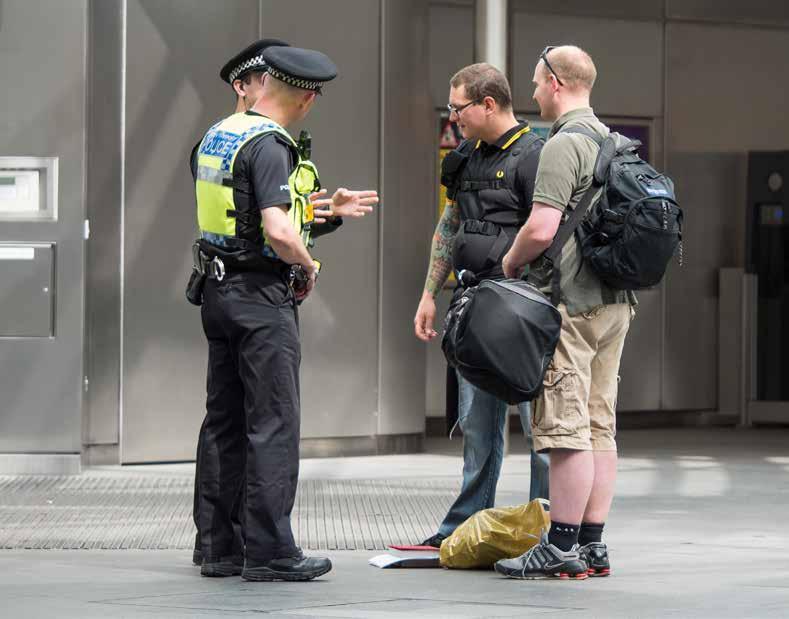
We protect and police 10,000 miles of track and 3,000 railway stations and depots every day. We police the London Underground system, the Docklands Light Railway, the Midland Metro Tram System, the Croydon Tramlink, the Sunderland Metro and the Glasgow Subway. We move and safeguard around six million people every day.
These are unique policing environments, with unique sets of needs. Our police officers and staff provide specialist policing across the country.
Furthermore, with the latest technology at our disposal we’re able to deal with rail crime that crosses counties and networks.
Our people must be trained to the highest standards in order to meet these needs.
It’s a challenging environment, one with everything you would experience in another police force and quite a lot more.
Join us and you’ll be providing specialist policing across the country. This is your opportunity to work in a unique environment and deal with rewarding challenges that you won’t find in any other Force.
You’ll be joining some of the best people in their field. You’ll share their enthusiasm for exemplary customer service, both internally and externally, and be able to make the most of your good commercial acumen.
We’ll reward your ambition and drive with the expert training you need to excel and to protect six million people every day. Your career development opportunities will be second to none with the possibility of taking on more responsibility, transferring to specialist units or choosing to go on secondment.
Here, you’ll be able to deal with unique situations that will challenge you. You’ll be amongst like-minded, talented people who share your passion for a job very well done. You can expect your salary to be competitive and your benefits to include:
• Up to 28 days annual leave for Police Staff and Up to 22 days for Police Officers.
• Cycle to Work scheme – you’ll have the opportunity to hire a bicycle from us to cycle to work and you won’t pay National
Insurance or tax contributions on what you spend up to £1,000.
• Season ticket loan – after your probationary period, we’ll give you an interest free loan that you’ll pay back straight through payroll each month.
• Financial Services Benefits via Police Mutual.
Police officers are often eligible for Key Worker Housing which can help you to get on the property ladder through government backed low cost ownership options.
There are four different ways to join the frontline of BTP:
• Police Officer
• Transferee
• PCSO
• Special Constable
It is the vital role of our Police Staff to support the operations of our Force. It takes every one of our 1400+ police staff to ensure our 3400+ officers can police 10,000 miles of track and face all of the challenges they meet. This takes leadership, policy development, national strategic planning, monitoring, quality control and advice functions for the organisation.
Our key departments are:
• People and Development
• Information Services
• Learning and Development
• Finance and Procurement
• Corporate Communications
We have a positive equal opportunities policy to ensure all applicants are treated fairly. We welcome applications from all areas of the community regardless of age, disability, race, colour, religious belief, marital status, gender or sexual orientation.
We work closely with Support Groups when we arrange recruitment campaigns, on the
impact assessment of new policies and procedures or how to adapt the working environment.
The Policing at Heights teams were set up to undertake a range of tasks including searching at heights, removing protesters and discarding of flash advertising.
The TPSU oversees our local Police Community Support Officers (PCSOs), Railway Safety Accreditation Scheme and Special Constabulary.

The CTSU consists of the following multi-disciplined teams:
• Explosive Search Dogs Section
• General Purpose Dogs Section
• Armed Policing Capability
• Special Movements Section
• Specialist Response Unit
Our police dogs provide a vital supporting role to reduce crime throughout the UK. They are trained to track suspects from crime scenes, chase and detain offenders, search for property at or near crime scenes and search for missing persons. They can also detect explosives, drugs, cash and firearms.
The Police Dogs Unit is broken down into three sub-sections:
• Central Operations General Purpose (GP) Dog Section
• Outer-London Police Dogs
• Explosives Search Dog (ESD) Section
Following the terrorist attacks in Mumbai and based on the current threat from International Terrorism being at “substantial” BTP created its own Armed Policing Capability.
Since 2012 key locations have been routinely patrolled by our highly trained armed policing officers. They are supported and are able to support colleagues in surrounding Home Office Forces upon request.
The safety of the public and staff is of paramount importance and these officers form part of the Counter Terrorism Support Unit who carry out high visibility patrols providing reassurance and a visible deterrent against terrorism on the railway.
Special Movements Section, whose main role is to provide policing support to the Royal Train, VIPs and strategic military movements by rail. They work in partnership with the Royal
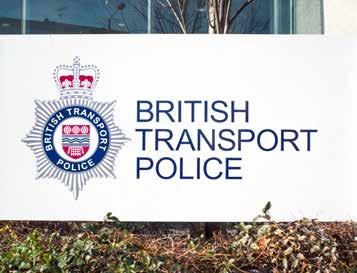
Household, MPS Royalty Protection group, other police forces and the rail industry. They also offer guidance about counter terrorism to areas and police stations.
SRU officers are police officers first. They deal with other incidents on the railway, including robberies, thefts and fatalities. However, their additional training and skills mean they can respond to specific incidents when needed.
They respond to reports of unattended items on the railway. They assess packages, bags and ambiguous substances such as unusual smells, powders, liquids and chemicals.
Our SRU is unique within British policing because of the broad spectrum of incidents that they respond to.
They use mobile 3D X-ray machines to examine unattended items. And, in the unlikely event of a chemical incident, SRU officers wear chemical resistant gas tight suits and deploy a hapsite to analyse the atmosphere and establish what specific chemical has been used. Our chemical agent monitors were designed for the military – they tell officers whether a substance is a threat or not.
This unit was set up to help officers to co-ordinate activities around suicide prevention, child protection, domestic violence prevention, sex offender management and mental health liaison for London North area.
This unit consists of the Sexual Offences Unit and the Workplace Violence Unit.
This unit investigates incidents of sexual assault or some cases of Outraging Public Decency on the Underground.
This unit has specialist knowledge of Honour Based Violence, Domestic Violence, Stalking offences and the DASH Risk Assessment Model. They collect statements, provide stills and storyboards from CCTV for London Underground staff crime.
Since the Potters Bar crash of 2002, a great deal of work has been done in Britain and internationally to improve DVI.
Part of BTP’s strategy in dealing with body identification after a disaster has been the deployment of a body recovery team. This is made up of officers from different areas who come together when the need arises.
Our FLOs are specially trained to provide a two-way flow of information between bereaved families and our investigation teams. They help support the family through the police investigation, answer questions and gather important information about the person who has died.
After a fatality on the railway, it is vital to gather a full picture of what happened as soon as possible, so that we can establish the cause and circumstances of their death. Our FLOs help us to do this in a way that is best for their family and friends.
Each Witness Care Officer acts as the single point of contact for a victim or witness. They assess the individual needs of a victim or witness and update them or the officer in charge about the progress of the case.
They also make arrangements for the victim or witness to attend court if they are required to give evidence and refer them to external organisations if they need more support.
The SSU is responsible for recovery, collection and submission of items for forensic examination and identification. They comprise
of several departments, all providing specialist advice and guidance to officers at all levels on forensic matters.
The HTCU is responsible for retrieving electronic evidence from digital devices, such as computers, mobile phones, SIM cards, memory cards, satellite navigation, USB devices, digital cameras and gaming consoles for use in court. They also provide technical advice and support to other officers working with digital media.

The FTSU provides covert technical equipment and expertise to assist with the prevention and detection of crime or disorder. For example, they can provide listening devices. They support and work in partnership with the Area Technical Support Units (ATSU).
This was set up in 2005 to monitor the 15 mainline London terminals for intelligence-gathering purposes and to help Officers with ongoing operations, live monitoring and pre-planned events.
The Economic Crime Unit is made up of three specialist units who deal with different aspects of financial crime
across the force, these include; corruption investigations, payment fraud and major fraud.
“To deliver a first class, specialist policing service for the railway and to be recognised by our customers as providing excellent value for money.”
“Our mission is to protect and serve the railway environment and its community, keeping levels of disruption, crime and the fear of crime as low as possible.”
• Integrity and Respect: acting with honesty and authenticity, demonstrating respect and understanding.
• Common Sense: taking a sensible and practical approach and challenging bureaucracy.
• Trust and Confidence: promoting confidence in BTP and the Policing Service, providing a reliable and consistent quality of service.
• Determination: always strive to achieve the best results for our force, the railway and the public.
• Professionalism: providing smart, skilled and consistent service at all times, representing BTP in the best light.
• Pride: take pride in working for BTP and serving the community.




Civil Service
You are getting ready to leave the Services and thinking about what to do next. Have you ever thought of joining the Civil Service? No?
Is it because you think civil servants are a bunch of pen pushers? That we sit around all day drinking tea? Let’s see if I can help change your mind.
Across the Civil Service there are a wide range of jobs and professions and these include project managers, analysts, statisticians, lawyers, finance and Human Resources roles – all the typical roles that any government department or private sector company might have.

But there is so much more to the Civil Service – there are departments such as the Home Office and National Crime Agency who lead on reducing and preventing crime and ensuring people feel safe in their homes and communities. Others, such as the Department for Work and Pensions (DWP), are responsible for understanding and dealing with the causes of poverty rather than its symptoms

and encouraging people to work and making work pay.
But the civil service department with the widest range of roles is the Ministry of Defence (MOD). Think of a job and you will probably find it in the MOD. In addition to the typical jobs mentioned before we also have teachers, police, doctors, nurses, dentists, surveyors, architects, divers, range wardens, farriers, falconers, dog handlers, guards, pool attendants (yes really). I could go on, but I hope you get the idea – there is most likely a role for you.
Maybe you think applying for a job will be complicated – you’ve heard about those tedious application forms asking for 250 words against a list of competencies that don’t really make sense to you. Do you wonder how you can tell people about your skills and experience? The Civil Service has changed the way we recruit. We use Success Profiles and they have
five elements that we can use to help assess if you are suitable for our jobs. Depending on the job will depend on which elements are used and it’s unlikely you would apply for a job that tests against all five elements.
But what are the five elements of Success Profiles?

• Behaviours – the actions and activities that people do which result in effective performance in a job.
• Experience – the knowledge or mastery of an activity or subject gained through involvement in or exposure to it.
• Ability – the aptitude or potential to perform to the required standard.
• Technical – the demonstration of specific professional skills, knowledge or qualifications.

• Strengths - the things we do regularly, do well and that motivate us.
Using Success Profiles helps us identify the right person for the job and enables us to me et our legal duty to appoint on merit based on a fair and open competition.
Being part of one of the three Services will have given you a great set of skills and experience which the Civil Service needs. We can offer you variety, in the roles that you do and where you will be based, training and professional development (including apprenticeships), flexible working, family leave and the opportunity to make a difference. The Civil Service aims to be the most inclusive employer by 2020 ensuring you can be yourself no
Helen Training Aircraft Portfolio Managermatter who you are, where you come from or how you think. You have served your country protecting the security, independence and interests of our country at home and abroad and being part of the Civil Service, you can continue to make a difference to people’s lives in the UK.
So, have I changed your mind? Have I persuaded you to think about joining the Civil Service and using your skills and experience to make a difference? If I have then you should consider signing up for an account on CS Jobs where all our jobs are advertised.

There’s also wealth of places where you can find out more about what we do and why it makes a real difference. Here are a few to get you started:
• Civil Service Careers www.civil-servicecareers.gov.uk/
• Civil Service Careers MOD www.civil-service-careers. gov.uk/departments/workingfor-the-ministry-of-defence/ • LinkedIn (MOD) www.linkedin.com/company/ uk-ministry-of-defence
• Working for the Ministry of Defence www.gov.uk/government/ organisations/ministry-ofdefence/about/recruitment
If I haven’t persuaded you to think of a career in the Civil Service, then I wish you all the best wherever you decide to work next. Remember you can always keep up to date on the latest developments in the Civil Service by following us @UKCivilService on Twitter, Facebook or Instagram.


I joined the Army in 1970 and retired in 1994, I must admit I knew little of the Civil Service having spent a considerable amount of time serving in Germany. On my last posting and return to the UK I worked at the Royal School of Artillery in Larkhill and that was my first exposure to civilians working with the military. When I retired I got an 18 months contract with the MOD working in security, before moving to the private sector where I spent 7 years learning to become a civilian.
I wanted a change of direction and returning to the MOD seemed like coming home, I was of course attracted by the good terms and conditions of service; the ability to build a good second pension, generous annual leave allowance and flexible working. I joined as an Admin Officer and have so far progressed to Senior Executive Officer, working in a variety of roles dealing with Army Resourcing, Employee Relations and Human Resources. Like many of my work colleagues I am very proud to continue my relationship with and support to the Services, particularly with the Army which is still very much in my blood.
I have adapted to the challenge of civilian life finding the transition easy and I have been supported in my journey along the way by some really remarkable people that I have worked with and who share my values and commitment to the Services. So, would I recommend the Civil Service and MOD to colleagues leaving the service as a second career, absolutely - it offers a challenging career and of course, there are the great terms of service.
When I was in uniform I worked alongside civilians but never really gave a thought to 'what' they were. It was only when I left the Service and was looking for another career (I wasn't interested in just a job) that I bumped into a military colleague I'd previously served with who told me about the Civil Service. She was in the process of making an application and suggested I investigate for myself. The application and recruitment process was quite straightforward and I was fortunate enough to receive an offer of a post in Human Resources.
Since then I've worked in a variety of civil service roles within Army, Air and at the centre of the Department in HOCS. Experience gained in my previous uniformed roles has been invaluable in supporting and advancing my civil service career (I've had 3 promotions) and it's great to still be part of the wider MOD 'family'.
The MOD is a great place to work, it offers a huge variety of jobs, real promotion prospects, learning and development opportunities, and last but not least excellent terms and conditions of service. The saying goes that the grass is greener on the other side - well for me, this is the other side!
"Thereissomething foreveryone;the opportunitiesare thereforthetaking!

The chances are, particularly for those who are still serving and looking to move away from policing, it’s probably something you’ve been thinking about for some considerable time.
For some, it may be even years, and it’s emotionally and mentally draining as you’re caught in the cycle of loving aspects of ‘The Job,’ and (some of) your colleagues, but hating so much more, what with the constant onslaught of negative press from the main stream media, the disastrous reforms and politicising of policing over the last 12 years, the lack of funding, lack of resources and significant reduction of salary in real-terms.
Then there’s the issue of increased burn-out and stress, and
For those approaching retirement or caught in the pension trap, it’s constantly there in the background, with many of us literally counting down the years, months, weeks and days, and reinforced by our colleagues with, what’s generally the second question after, ‘how you doing?’… ‘How long have you got left?’
So why is it so tough, even when there are so many reasons to leave?
For many of us, me included, (I’m a former Cadet, joining at 18), policing is all we’ve known, and the thought of leaving it behind and the uncertainty and potential lack of security, whilst trying to find a new job or navigate a new career path can be incredibly unsettling.
fulfilling new role or career outside of policing, as long as you take some action. You might find it takes a while and you may have to deal with some knock-backs, however, as long as you’re taking action, identifying what went well and not so well, and what you can do better next time, things will work out for you. I know this because I’ve done it myself, I know many others who’ve done it, and I’ve helped many others do it too.
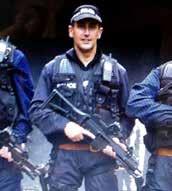
Nic was a former Detective who’d worked in financial crime and left to join a high street bank working in financial intelligence but after 5 years, she decided she needed another change in direction, and approached me to help her. She wanted a complete change and so we worked 1-2-1, and she’s recently transitioned to a new career in sales and is earning more money, her hours have improved and instead of following the path the impact on officers and staff mental health due to increasing and excessive workloads, greater scrutiny and criticism from those with 20/20 hindsight, and then there’s the sheer volume of traumatic incidents causing many to suffer differing degrees of PTSD.
It’s no wonder more and more officers, some barely out of their probation, and many towards the tail end of their service, when you might think the pension would lock them in, are looking at their options away from, what started out for many as a calling and vocation.
Add to this, (regardless of how we feel about the job), the loss of identity, who and what we are, and what we represent, can fill us with a genuine sense of fear and trepidation. Despite all the negativity surrounding policing, there’s still a degree of status around what we do, and that can be difficult to let go of or replace.
Then there’s the conundrum of working out what jobs we can do, who is going to want a former police officer, and where are all these companies lining up to employ us based on all those fantastic ‘transferable skills’ we keep getting told about by our mates, some former cops on LinkedIn and social media.
Let me give you some reassurance. Whatever your age, whatever your length of service, whatever your role, whatever your rank and whatever your reason for leaving, you can and will find a
of least resistance like many cops do, by taking a complete pivot, she says the role and the organisation feel much more aligned to what she wants from a career.
Pete was a frontline response cop for nine years and approached me when he was pretty close to breaking point. He’d been a tutor Constable and won a couple of awards and had a fantastic work ethic. We worked 1-2-1 and worked together through the application and interview process and soon afterwards, he was offered two roles, one of which was his dream role within the Civil Service. He has his evenings, weekends and social life back and loves being back in control.
Lynda was a long-time former police staff, who’d left when there were threats of redundancies. She stayed with this company for a number of years but was actually made redundant and couldn’t find new employment. Her confidence was through the floor, and she was struggling. We worked hard on her mindset, confidence and self-belief and soon after she was offered two roles and chose the role that most aligned with the happiest time in her previous career as police staff.
Paul was an Inspector but was getting more and more frustrated with the lack of progression and had been toying with leaving for almost 5 years but had no idea what he could do. With some real effort and guidance, he successfully transitioned to a role as a Project Manager and has recently joined a fantastic Consultancy.
Kelly Kelly had been working on the Domestic Violence Team and Online Paedophile Unit and had suffered significant ill-health, including cancer. She’d been considering leaving for over 2 years. Within 5 weeks of working together, she had the offer of Safeguarding and Welfare Lead for an Academy. She’s since been promoted and has helped others find new roles in safeguarding.
Marie had had a tough time and been subjected to some poor line management and her selfconfidence had taken a hit. She was also a new mum and needed a role that was more family friendly and more aligned with her values. We worked together and she successfully applied for and transitioned to her new role as a University Lecturer.
So, what can you do to identify what jobs you can do and
those ‘transferable skills?’
• Try and really understand why you feel the way you do and be honest with yourself. Sometimes a change in role, or organisation can reinvigorate your career. Sometimes, a complete change isn’t the right thing for you.
• Identify the areas of your current or your best role that you enjoyed the most and identify why they make you feel that way
• Are you victim focussed?
• Do you need a role where you can make a difference?
• Do you have exceptional attention to detail, love deep diving into data and investigations?
• Do you love working in a team, or on your own?
• Do you love coaching and mentoring?
• Do you prefer to follow SoP’s and working in a regulated environment?
• Identify what you dislike and never want again
• Are you suffering empathy fatigue?
• Do you dislike confrontation?
• Do you dislike shifts and weekend working?
• Are you struggling with being managed?
• Do you hate working in such a politicised sector?
These are just a couple of examples of the type of questions and level of detail you need to drill down into to understand what you want and don’t want from a role.
• Think about your achievements
• What are you most proud of during your service
• This isn’t necessarily when you’ve been formally recognised
• What have you delivered?
• Where have you really made a difference or impact?
• Where have you helped improve a way of working or left a legacy as a result of what you’ve done?
• What statistics and data do you have to back up your achievements?
Now those who’ve been working with me or listening to the podcast for a while will know I hate this phrase. It’s overused and over simplifies what you’ve learnt and achieved during your service, and when you’re up for interview against people who have been working in that exact role, in that industry for a while, you need more than being able to show you have ‘excellent communication skills’ or ‘the ability to solve problems’ or ‘work well in a team.’ I’ll explain where the magic happens shortly.
The College of Policing do help us a little here with their Professional Development Platform which you can find here: Home - College of Policing
This was developed to help officers understand how their prior
learning and experience can help give them accreditation and credits for further and higher education, however rather helpfully, it also helps you understand what you are accountable for, and to know your essential skills, experience and qualifications. It’s not there for career change purposes of course, but it will help you at a basic level. By heading to the professional profiles section HERE, you click on your rank and role, keep clicking through and it will list out examples of your key skills.
However, listing roles and responsibilities isn’t enough. The magic only happens when you have good examples to back those skills up, linking them to your key achievements and proudest moments. A potential employer is only interested in where you’ve made a difference, what you’ve delivered, and whether you can solve their problem for them, ideally supported with data or statistics. E.g., ‘By taking this action, there was a reduction of X percent in antisocial behaviour and criminal damage,’ or ‘by recognising the inefficiency and changing the process, it saved our department X and reduced sickness by Y.’
Remember, they need someone who can hit the ground running, can make a positive impact, has the skills and experience to undertake the role and is going to fit well in the team. So alongside
evidencing why you’re a great fit for the role, be humble, show you’re willing to learn and be positive, upbeat and likeable.
There are very real emotional and psychological barriers to making that career change, whether serving or on retirement. But by recognising that what you’re going through is absolutely normal, and that you can dramatically increase your chances of a successful transition by identifying your skills and experience, identifying what it is you want and need from a role, seeking out those outliers and following the steps that they’ve taken, being coachable and taking action, that change needn’t be as scary as you think, and for so many, it’s a hugely positive step that gives you back control and significantly improves your relationships, your earning potential, your mental health and wellbeing and your quality of life.
ABOUT ANDY Andy is a former Sergeant who left policing in early 2015 after 30 years to become a Project Manager. He then moved to Business Change and went freelance and moved into IT, working alongside the likes of Microsoft, PwC, EY, Afiniti and others. He became Platform Lead for Modern Workplace Technology for ASOS and is currently an IT Change and Engagement Consultant working freelance for an IT Consultancy.
He has been helping police officers, staff and other emergency service professionals find new careers since 2018 and Blue Light

Leavers was created in 2019 to help on a larger scale. Andy delivers resettlement training programmes to forces on behalf of Red Snapper Recruitment, and is looking to expand this offer to other forces, he also delivers online group training programmes, a 1-2-1 career finder services, a subscription membership called The Academy and hosts the Blue Light Leavers Podcast.
You can join the private Facebook group via www,facebook. com/groups/bluelightleavers and contact Andy for any help and support via andy@ bluelightleavers.com

With the advent and growing global importance of harvesting energy, to help preserve natural resources, and the national shortage of both residential properties and on-going build of new commercial projects - The UK government has identified a huge skills shortage in this growing sector; the demand for people with renewable qualifications is growing.
A blend of online and practical training, taking place within a fully equipped national training centre to suit your location
Our courses are designed to take you from a beginner to fully qualified (both Theory and Signed Practical), providing you with a detailed grounding in principles and evolving technologies for you to work safely and legally across this sector (Residential and Commercial).
• From Tech Cert To BPEC NVQ In 6 Weeks
• Unique On-site Signed Portfolio Training
• Flexible Part-Time Learning (Evenings and Weekends)
• National Training Centres and OnSite Practical Modular Learning
• New courses start every month
• Courses from £35 per week
• Interest-Free Payment Plans available
The main objective of this job-ready training course, to give you "handson" knowledge and practical skills - regardless of your current level. A uniquely structured blended learning program, delivered by a combination of theory and practical skills – Interest-Free Payment Plans Available…
The courses are designed to suit your personal circumstances and can studied full or part-time –allowing you to fit the study around your work or family commitments.
The training centres are open weekdays and weekends, for you to book study times to suit you
All both theory and practical courses are competitively priced
with no extra hidden costs (from £35 per week). With flexible interest-free payment plans available to help spread the course cost – don’t delay, apply today.
The experienced tutors share their knowledge to teach you the required skills, so you pass your exam modules at your own pace to suit you
Employers require to see all individuals have relevant Trades experience, carried out on-site. Trades training ensure you receive both NVQ practical training, not just an online theory certificate

Trades individuals have to obtain the correct qualifications and certificates to gain employment.
All the courses are fully accredited by academic bodies such as City and Guilds, ACS and to NVQ Level 2/Level 3 standard. You’re taken from a novice to be fully qualified Trades professional. ECS and CSCS Cards arranged for individuals.
For over a decade we’ve assisted individuals discover their potential, starting a new career within the trades industry. If you want to retrain or simply change your career to higher earnings - we can help you kick-start your new career.
Other Trades Training websites offer different Trades courses; some short (theory only), some long (our aim is to get your fully trained as-soon-as -possible and earning), and some with out-of-date non-relevant accepted courses.
We want you to choose the most suitable course; offering not just the technical theory certificate but can also the important vocational practical NVQ (National Vocational Qualification).
An NVQ is the on-site training employers require; you can progress from a novice level, to being fully qualified and employable.
There’s a growing skills shortage across the UK for Trades professionals. If you look at the job-boards, you’ll see many job vacancies for each Trade - Employers urgently require qualified trades individuals to fill this gap. ECS and CSCS CARDs arranged for individuals.
The on-gong demand for qualified trades people, outweighs the supply – there’ s a UK and Overseas skills shortage. Many government reports predict there will be a huge demand for qualified trades people in plumbing, electrical, gas engineer, renewable engineer and welding.
Learning and qualifying within a skilled trade can mean, a job for life and potential to earn. Potential to be your own boss/
become self-employed, to have the freedom to choose how many days and hours worked.
From school leavers, to adult re-trainers who wish to learn a trade, to trades individuals who wish to obtain a further recognised Trades qualification. Armed forces personnel who have left the military services and wish to re-train - allowing to gain entry and employment in the trades sector. Individuals who have been made redundant from their previous job and see a career as a Trades professional as new start.
• Residential House builds– ongoing demand for new housing
• Property Management – the management of private or commercial properties
• County Councils – management of local properties
• Multi-Nationals – who represent their own contract clients
• Sole Trades/Self-employment
– individuals working for themselves or setting up their own business/ sub-contacting work
• ECS and CSCS CARDs arranged for individuals
Trades individuals have to obtain the correct qualifications & certificates to gain employment. All the courses are fully accredited by academic bodies such as City & Guilds, ACS and to NVQ Level 2/Level 3 standard. You’re taken from a novice to be fully qualified Trades professional ECS & CSCS CARDs arranged for individuals.

A blend of online and practical training, taking-place within a fully equipped national training centre to suit your location.
Flexible to suit each Individual/How long does it take The courses are designed to suit your personal circumstances and can studied full or part-time –allowing you to fit the study around your work or family commitments. The training centres are open weekdays and weekends, for you to book study times to suit you. Qualified Experienced Tutors
The experienced tutors share their knowledge to teach you the required skills, so you pass your exam modules at your own pace to suit you.
On-site training; with a signed portfolio-of-work Employers require to see all individuals have relevant Trades experience, carried out on-site.
Trades training ensure you receive both NVQ practical training, not just an online theory certificate.

All both theory and practical courses are competitively priced with no extra hidden costs. With flexible interestfree payment plans available to help spread the course cost – don’t delay, apply today.
www.tradescareers.co.uk
You will be admitted to the programme either on the basis of recent academic achievement or through evidence of achievement in the sphere of your current work. Full details of acceptable qualifications are given on the City, University of London and CILEx Law School websites.
If so, you could consider studying for the LLB in Legal Practice by distance learning. This is a four-year programme that allows you to earn alongside study. The fees are £18,500 in total payable over four years, so they compare very well with course fees for full-time degree courses.
The law degree provides an excellent foundation for training as a solicitor, barrister or Chartered Legal Executive.
“This course will not only give you essential legal knowledge, but the skills and confidence to apply it in real life situations.
Although you may be physically at some distance from the University, the extensive support available makes this programme a very attractive alternative to full-time study.”
On graduation you will be eligible to undertake further training towards becoming a solicitor or barrister. Both of these professional qualifications require a further programme of study.

The degree has been designed to ensure that you will be exempt from all academic study necessary to qualify as a Chartered Legal Executive, although you will need to fulfil the work-based learning element, for which you will need to be employed in the legal sector. The route to qualifying as a Chartered Legal Executive may change in the course of the programme, but transition arrangements are likely to be put in place.
During the period of study you will have access to City’s careers service who have designed a bespoke programme for students on this course. Whatever your final
ambitions, since this course is delivered by distance learning, you could, depending on your personal circumstances, start applying for a role in the legal sector alongside your studies, perhaps as a member of support staff such as a legal administrator or paralegal in order to get a foot in the door.
The City Law School, incorporating the former Inns of Court School of Law, was the first University Law School in London to educate students and practitioners at every stage of legal education.
The City Law School is part of City, University of London. Founded in 1894, the University is among the top 15 universities in the UK for graduate employment.
Its aim is to develop the professional, dynamic, highly motivated, and “practiceready” lawyers of the future.
CILEx Law School has over thirty years of experience in delivering distance learning courses in law and legal practice. It has over 3,500 students enrolled on distance learning courses, and has excellent administrative and student support facilities in place for the remote learner.
CILEx Law School is a notfor-profit organisation wholly
owned by the Chartered Institute of Legal Executives.
The programme includes the core law modules common to all law degrees that qualify you for further study to become a solicitor or barrister. You will also select from elective modules in years three and four, which include the practical elements that make this degree so distinctive. The choice of elective modules allows you to tailor your study to your career aspirations by choosing the areas of legal practice that interest you most.
The course is offered jointly by CILEx Law School and City Law School.
The programme starts with a two-day induction course on 21 – 22 September 2019. This is designed to give you the skills needed to manage your study successfully. After the induction session you will be set a weekly programme of work for each of the modules.
For each module the syllabus is delivered through a dedicated online learning area giving access to specially designed materials, webcasts and exercises.
Formative assessments give you practice in applying the knowledge that you have gained, and feedback
from tutors helps to develop your understanding of the subject matter.
The detailed weekly timetable means that you will have a structure to work to, and you will have access to the teaching and support teams to give advice and guidance by phone, email and online forum as you go along.
There is a revision weekend to help you prepare for exams, where expert tutors will guide you through the syllabus highlighting key topics and explaining points of special significance.
The induction, revision and exam sessions are all held at City Law School’s premises in London. Other than this, there is no attendance requirement. CILEx Law School is a specialist in supported distance learning, and although you will not attend classes regularly, you will have all the support you need to achieve success through the extensive tutor support and sophisticated resources available through the online learning environment.


The Services recruit, train, develop and employ people in roles that are demanding, physically and mentally challenging, occasionally traumatising and frequently in austere conditions and /or environments.
Instilled in each and every service person is the sense of duty and commitment and the roles often involve some level of personal sacrifice. The positive corollaries are around the sense of being part of something important, something vital and working with likeminded individuals as part of a wider connected team.
Leaving this kind of committed environment can be one of the most difficult things service people can do, and while many look forward to the day they can hang up the uniform and or accessories, there is an awareness of the practical, emotional and psychological changes ahead.
Positive Transition Limited was founded in Feb 19 to leverage 22 years’ experience of providing
transition support, exploit technology and deliver a solution that empowers the individual and the family in making the very best of the life changing circumstances. The early concept was to deliver personalised, scheduled, time appropriate reminders, information and guidance to empower the user in addressing all aspects of the transition process according to their circumstances. The concept has grown considerably through development
Positive Transition is well into developing a platform aimed initially at service men and women leaving the Armed Forces and then looking to work closely with the Emergency Services to provide a platform for people resettling from there.


The platform, referred to as +t (Plus tee), will be available via web and mobile devices providing the practical support in identifying and preparing for a second career, managing the practicalities of life and also supporting in the wellbeing aspects of such a life changing event. The service will be made up of modules of support that will be available based on some basic survey questions, and then provide a bespoke dashboard view for individuals to manage their own transition and resettlement experience.
This dashboard view with early User interface shows the modules available. Many are interrelated and connected and so, the platform can support in providing holistic and relevant information as required.
People moving from a career in service often find it difficult to identify a second career and then determine the transferable skills that they have developed during service. The issue then becomes how you articulate those skills in a format relevant to the role you
would like to undertake. The employment support on +t takes the user through a process of understanding who they are, how they work, what kind of work they find fulfilling and then recommends some suitable roles. From there, information can be collated about the roles that are of interest and provided in a comparison table to support in decision making. Once the user has identified 1 to 3 specific roles, then the platform provides support in CV writing and Interview techniques. The digital media in video or audio format can be saved to the “Kit Bag” on the profile, and this will upload to the mobile device with the licence to stay on there for a set period. After that period, the file will self-delete from the device avoiding application bloat.
For people that are relocating, there is advice and guidance available on the new area, with details around health services (GP’s, Dentists etc) and schools in the location. The GPs and Dentist information can also be accessed for when people are working or holidaying away from home.
Life changes are incredibly stressful periods and so. critical to the resettlement process is wellbeing. The +t platform provides a wellbeing checker for people to gage how they are feeling ensuring that they pay attention to it and ask the questions of themselves rather than just battling through. Where people start to identify a build-up of stress, then there are low level exercises and techniques available in the wellbeing module. If people do not engage with these exercises, then there will be in app notifications and reminders that looking after yourself is essential to a positive outcome.
POSITIVE TRANSITION IS CLOSE TO DELIVERING THE MVP AND LOOKING TO START BETA TRIALS IN THE NEAR FUTURE While it is aimed at the Public Services community, Positive Transition is in talks with other possible customers where career change is having an impact on the mental health and wellbeing of the people involved. The digital platform ensures that people are


empowered to take ownership of their own life management and also have the ability to reach out to support as and when they need.
Professional Sport, First Career, Independent Living and Living with Life Changing Injury or Illness are just some of the potential markets being looked at. In the longer term, a “lite” version of the service could be available for other life change situations such as Marriage, Divorce, Bereavement and even House Move. All situations that are recognised as being stressful down to the amount of information needed and actions to be performed in a timely fashion, and all on top of the normal life activities such as work, family, home and garden.
For more information, go to the website www.plus-t.co.uk
Or email info@plus-t.co.uk


Delivering training programs to achieve correct qualifications for working within the Executive Protection (EP) Sector and as an overseas Private Security Contractor (PSC).
UCP are one of the very few
with
to specific
UCP are one of the longest
British
that specialise in Close Protection medium to high

and
companies including our own UCP Operations division.
and UK
guide you all the way; from initial talks about the industry
helping and supporting you until you initiate employment.
never give
on the ELCAS website and social media. Also, with being a CTP Member, UCP makes your choice a safe one when it comes to choosing your training provider. UCP are proud to serve the MoD in providing the very best training and post-employment support for British Soldiers.
only.
UCP have eight main Instructors with backgrounds from; 2 Para, (RMP) Royal Military Police (former SO14), RMP CPU (SEG) UK Special Forces, British Royal Marine Commando, Former Mi5 agent, and a wealth of knowledge from our highly trained and seasoned Civilian Instructors.

Since 1991 UCP Security Services “Operations” have been protecting VIP clients, Celebrities and Government officials (UK and overseas) not to mention being tasked with providing pre-deployment training for teams on high-risk operations.
Since 2003 Up Close and Personal Group have been training overseas Internal Security Forces from Asia, Middle East and Africa.
6. UCP UK Training provides the security industry with a database of highly trained operatives.
UCP Operations division also work with many other security contracting companies (UK and overseas)
1. 18 day Working as a Close Protection Operative including: Working as a Close Protection Operative, First Response Emergency Care (FREC), Surveillance (Urban, Rural and Technical), (H2H) Hand to Hand Unarmed Combat, Concealed firearms, B6 Armoured Vehicle and Drone Operator £1862 + Vat (£2232) ELCAS claimable: Yes. Training Provider number: 5011. Courses delivered every month: 1st -18th.
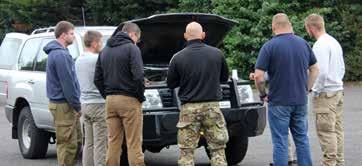
2. 10 day combined tactical Live Firearms (Level 3 HABC (9mm/5.56mm/7.62mm) for Hostile Environment Close Protection Officers including: HE Drone Operator, B6/7 Armoured Vehicle, (PSC) Private Security Contractor and (CQB) Close Quarter Battle. £2000 + Vat (£2400). ELCAS claimable: Yes Training Provider number: 5011. Course delivered every month: 18th – 27th.
3. Combine the courses 1 and 2 and complete the full 28 day CPO course. ELCAS claimable: Yes. Training Provider number: 5011. Course delivered every month: 1st -27th.
RELEVANT INFORMATION TO BOOK A COURSE Call 00447966176129 (mobile and overseas) Call 01474 832032 (Academy direct) Call 08001951644 (Freephone and main London admin office) contact@ucpgroup.co.uk jemma@ucpgroup.co.uk
ELCAS Approved training provider number: 5011 Careers Transitions

Our training will allow you to apply for your SIA front-line licence for VIP protection as well as working overseas as a private security contractor.

Delivering the training schedule to achieve correct qualifications for matching job opportunities and referencing the training cost to fit perfectly within your enhanced learning credit claim.
HABC Level 3 working as a close protection operative
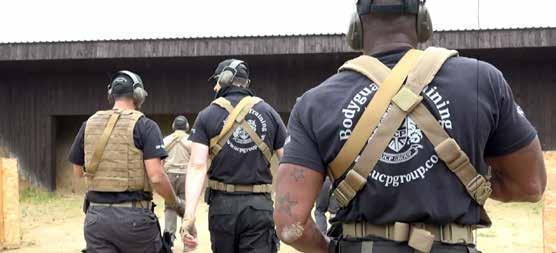
Responder Medic training
Environment
Protection Officer (PSD, IED, PSC)
Armoured Vehicle training
of drones within security
competency level
Military Contractor (CQB, SERE)
Team Leadership for
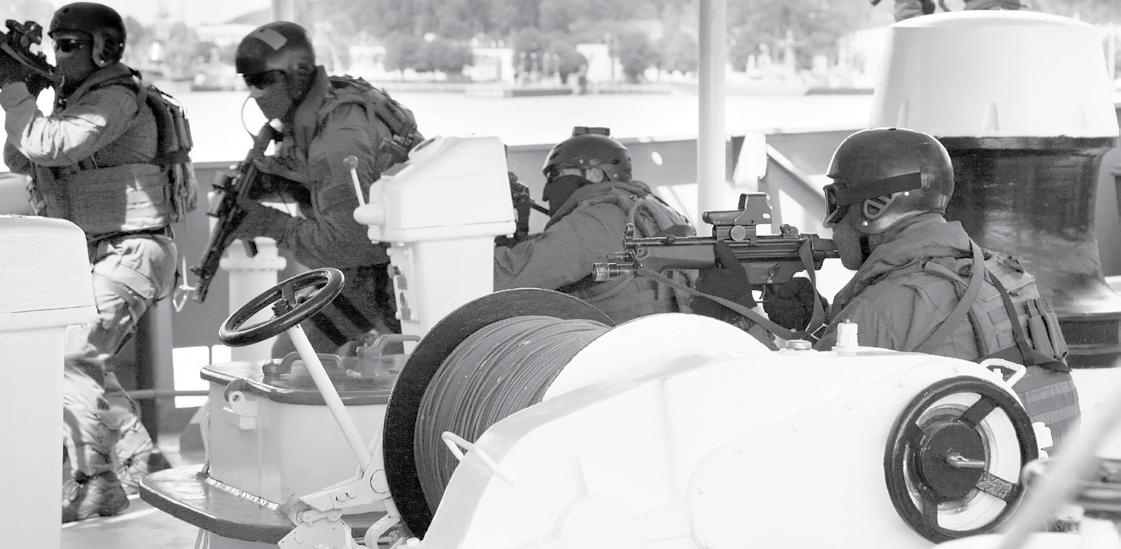
require strong communication skills along with presentation, knowledge management, problemsolving and critical thinking.
which provide formal training to learners to move and handle people and objects safely within all industries and areas of work.
RoSPA has over 100 years of safety expertise, offering one of the widest ranges of safety training courses in the UK.

The health and safety profession is now more popular than ever. More and more people are entering the field to not only enjoy a long and satisfying career but to also make sure that at the end of a long day’s work, everyone gets home safely.
And with pressure mounting on businesses to maintain a high health and safety performance, the door is wide open for health and safety professionals to make a real impact in the workplace and enjoy a rich and rewarding career at the same time.
Not only that, working in health and safety isn’t just morally rewarding, the average top-end salary advertised this year came in at £47,500, well above the UK national average. But before all this, individuals must develop their career in the field, by expanding their skills and knowledge with an industry recognised qualification.
It’s this approach to everyday life which makes them so compatible for health and safety - by taking the necessary steps to avoiding lifethreatening and harmful situations.
When transitioning out of the police however, ex-police personnel may not always have the experience they might need to get into organisations right away without having actually done the job.
But more often than not they may have acquired key skills which can be utilised to great effect if given the right role. Indeed, many of the skills forged during an army career can prove invaluable in the transition to civilian life. This can include good communications skills, the ability to problem solve, attention to detail and having strong managerial skills.

There are two levels of Health and Safety qualification available for individuals to attain, from short introductory courses to higher strategic level courses. Both routes

The most popular option is NEBOSH (National Examination Board in Occupational Safety and Health) which offers globally recognised vocationally-related qualifications designed to meet health, safety and risk management needs in all places of work. These qualifications include the NEBOSH National Diploma and NEBOSH National General Certificate, both of which are recognised by the Institution of Occupational Safety and Health (IOSH).
In addition to NEBOSH, there are also vocational qualifications available from RoSPAQualifications
We place client satisfaction at the forefront of what we do. Not only do we have an exceptionally high pass rate, we remain committed to our belief that learning should be an enjoyable experience for delegates.
Our team of expert trainers is our biggest asset. They use a variety of interactive training techniques designed to keep delegates engaged and involved while they learn, many of whom return again and again. Our tailor made solutions also ensure our client’s specific needs are met more exactly than a general course would do.
RoSPA also works with the MOD's Enhanced Learning Credits Scheme Administration Service (ELCAS), which provides its members with financial support in the pursuit of higher level learning.
By the time members of the Police Force have finished their career in the Police they have developed an affinity for discipline to the point where it’s become second nature.
The Royal Society for the Prevention of Accidents has been at the heart of safety and health in the UK since 1916. Since our early days improving road safety during the blackouts of the First World War, we have existed for a simple reason – to stop the needless loss and devastation caused by accidents. A registered charity, we are committed to continuing this legacy of change through a whole-life approach to the prevention of accidental deaths and serious injuries at home, at work, on the road, at leisure and in schools and colleges, as we strive for our vision of Life, free from serious accidental injury.
According to figures from the Department for Transport, in 2019 there were 25,945 seriously injured casualties in reported road traffic accidents and a total of 1,752 people were killed on British roads.
In order to reduce this shocking figure, RoSPA Advanced Drivers and Riders encourages an interest in road safety by improving standards, knowledge and skill.
We are seeking either serving or retired Police Officers within the UK to join RoSPA Advanced Drivers and Riders as Examiners. Reporting to a Regional Senior Examiner, you will be required to test members on the RoSPA advanced car, bike, LGV and PCV test as well as Experienced Driver Assessments, in line with RoSPA policy, and issuing individual written driving reports. Tests will be allocated regionally so applicants can apply from UK wide.


With the opportunity to continue working in a role that supports national security and public safety, joining the Ministry of Defence Police (MDP) could be a great career transition for you.
We value the skills and experiences that you will bring from your military career, and with the MDP you’ll have lots of opportunities to learn and develop new skills too.
Whilst we don’t offer a policing role where “blues and twos” scenarios will be a daily occurrence, what we do offer is a specialist policing role of national importance, with structured shift patterns, a good work-life balance, and a breadth of future opportunities to further specialise and progress in your policing career.

As an MDP New Recruit, you’ll complete police training to be an Authorised Firearms Officer, and on station carry out static armed duties and patrols by foot and vehicle, within a
working environment with which you will be familiar.
You’ll provide a vital role in deterring threats and reassuring staff and members of the public in the surrounding area, whilst liaising with a range of policing and security partners, in and outside the wire.


Interested? Excited?! Keep reading to find out more about who we are and what we do…

We value difference and recognise that great minds do not think alike. We’re committed to creating an inclusive culture where you can bring your whole self to work, and individuality is truly appreciated.
Our inclusive culture is underpinned and supported by MDP LGBT+, Gender, Disability and Wellbeing (DAWN) and Race, Ethnicity and Cultural Heritage (REACH) staff networks.
Don’t just take our word for it… here’s what some of our officers had to say on their experiences of joining the MDP, following military service.
“Being part of the police family has the same sort of feeling of solidarity as I felt being part of the military… The sense of security and being able to settle down, that my role with the MDP has given me and my family, is great and I’m so glad to still be working in Defence too, where I feel that I really belong.” Sarah, PC Marine Unit Officer
Have you left, or are getting ready to leave, the Police? If you’re considering which career path to take next, the Ministry of Defence Police could offer just what you’re looking for…
Who - The Ministry of Defence Police, more commonly known as the MDP, serving Defence, US Visiting Forces, other UK Government Departments, and sites of critical importance, across the UK
Our purpose - Delivery of specialist policing, to protect the nation’s defences and national infrastructure
Our people - A Force of around 2,800 police officers and 240 nonuniform civilian staff, from diverse backgrounds, proud to serve Defence and the communities in and around the sites we protect
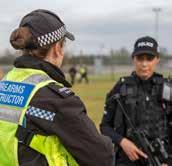

Where - At locations across the UK, including Faslane and Coulport on the Clyde, the Atomic Weapons Establishment sites at Aldermaston and Burghfield, Portsmouth and Devonport Naval bases, US Visiting Forces bases, Defence munitions establishments and other Defence sites, including Defence HQ at Whitehall and establishments in North Yorkshire, Derby, Thurso, and Barrow-in-Furness
Our capabilities - Our officers are equipped to respond to a range of crime and security related threats and risks that require specialist and dedicated civilian policing capabilities. These include:
• Counter Terrorist Armed policing that meets national standards and contributes to the UK’s strategic armed policing response to major incidents
• Nuclear policing, providing specialist armed policing services to support protection of the UK’s strategic nuclear deterrent
• Specialist armed policing units

• Police dog teams, with search capabilities

• The largest Marine policing capability in the UK
• A Crime Command, focused
on combating the threat and risk of major fraud, theft, bribery, and corruption against Defence interests, with counter terrorism and extremism intelligence capabilities
• Protester removal teams
• Project Servator officers, deployed in uniform and plain clothes, specially trained to spot the tell-tale signs of terrorist and other criminal activity
• Annual pay increases, linked to performance (including fitness and attendance)
• Location allowances payable at specific sites

• Principal Civil Service Pension Scheme that compares well with much of the private sector
• Flexible options and services to support your health, wellbeing and fitness including: the 24-hr Employee Assistance Programme helpline; Mental Health First Aiders; and access to gyms, fitness instructors and a Force Dietitian
• Opportunities to achieve nationally recognised qualifications from professional institutes
“For me the MDP offered a perfect career transition, where I could move into policing (something I had always wanted to do) whilst also working in an environment and armed protective security role with which I was, of course, very familiar… With my military background, the move into armed policing at Defence sites felt like a natural and comfortable progression in my working life.” Rachel, PC Authorised Firearms Officer

“Like the Army, the MDP is a team sport. I always enjoyed working as part of a team and I could see that the duties on station all required strong teamwork. The chance to explore different specialisms within the MDP was also of interest to me.”
Ian, Armed Mobile Patrol PC
To find out more about what it takes to join MDP, and for up-to-date information on current and future vacancies visit www.mod.police.uk
Coming soon… You can also meet us at Career Transition Partnership 2022 Employment Fair events, at the following locations…
• South-West - 9 June
• Leeds - 22 September
• Southampton - 6 October
• Newark - 10 November
Visit www.ctp.org.uk for further details.
Read Sarah’s, Ian’s, and Rachel’s stories at www.mod.police.ukyou are looking for a new career, have you considered re-training to become a residential surveyor?
W orking as a residential surveyor and valuer is the perfect way forward for those with an interest in property. This professional and well-respected career commands excellent salary prospects and, due to a skills shortage in the industry, demand for surveying services is ever increasing. The Sava course is now ELCAS approved, allowing members of the armed forces to secure financial support for higher level learning. For further detail on how to secure up to £2000 funding please read on.
There are many aspects to the career and many options once qualified, but residential surveyors are mainly known for carrying out HomeBuyer Reports and valuations on properties prior to sale. It is a varied and flexible career with many

opportunities either working for yourself or for a firm.
Alan Milstein, a residential surveyor and chairman of the Residential Property Surveyors Association (RPSA), said:
“Being a residential surveyor is a rewarding career. In essence, residential surveyors assess properties for their general condition, energy efficiency and value, and those on the Sava Scheme can also produce Home Condition Surveys which help home buyers understand the condition of the property they want to purchase.
“Residential surveying is an integral part of the housing market and offers good prospects, with potential for qualified surveyors to work within companies such as estate agents and banks, or to set up on their own and offer surveying services on a
consultancy basis to businesses and home buyers alike.”
Residential surveying could be the career for you if:
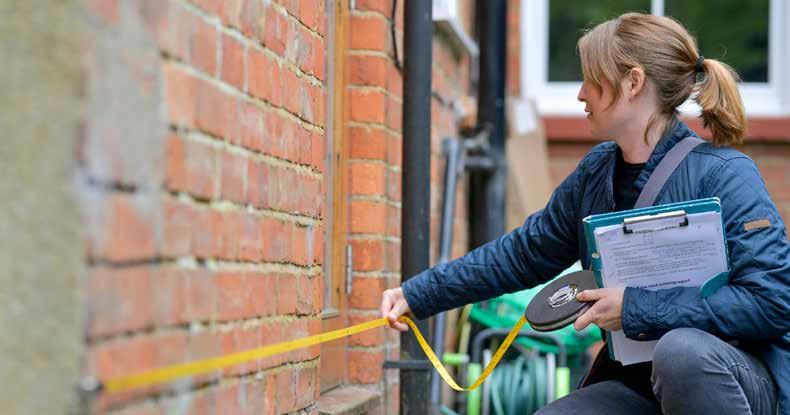
• You find property interesting
• You want great career prospects
• You want a role that’s in high demand
• You want to be well paid - the average AssocRICS salary is £49,293 (source: RICS 2018 UK rewards and attitude survey)
• You want flexible employment opportunities, including self-employment
• You want a well-respected career path
• You like challenges and for each day to be different
• You don’t want to be sat at a desk all day
Sava offer the only vocational qualification with direct entry into the Royal Institution of Chartered Surveyors. The course is structured
to allow learners to continue to work full time whilst studying if they wish as the course is delivered with 12 months of part-time training, involving 2 training days a month. This is followed by 12 months of assessment which is carried out in your own time. The course teaches you everything you need to know to become a competent surveyor and no prior knowledge, experience or qualifications are needed.

Once qualified, Sava graduates are eligible for direct entry into RICS at Associate member level, meaning they can offer RICS products such as HomeBuyer Reports and valuations, as well as having the prestigious AssocRICS designation after their name.
Hilary Grayson, head of surveying services at Sava, says:
“Residential surveying is particularly suited to those who are passionate about housing, confident in dealing with other people,
The Diploma is a vocational qualification, meaning it is all about giving you the skills and knowledge to be a well-rounded residential surveyor. Some of the modules covered include:

• Valuation - Determining property value, RICS mandatory requirements, how condition affects value, regulatory and legal requirements and different types of valuations.
• Construction - This module focuses on foundations, floors and walls, desktop research, scale drawings, floor plans and calculating U-values as well as building services.
• Law - The law and its background, easements, restrictive covenants,
determined and self-motivated, and have a good eye for detail.
“We believe these people could help to alleviate the looming skills shortage in surveying, and could become new associate members of RICS, an accreditation that is so important both professionally and to the industry as a sign of quality.”
We got in touch with Matthew to find out his views on the
contract law, negligence and occupier’s liability are looked at in this module.
• Inspecting Property - The inspection ‘agenda’ and equipment, property measurements to include floor, volume and ceiling as well as the residential cost-rebuilding calculator.
• Building Pathology - This module focuses on the process of diagnosing the cause of building movement, damp and defects. It includes ground and above groundbased movement plus loads more.
• Assessing Services - This module looks at service systems and what can go wrong. It covers inspection and testing of service systems, electrical systems, heating services, plumbing and drainage.
course and asked Matthew what made him join the Sava course after leaving the Royal Navy, he responded:
After serving almost fourteen years in the Royal Navy as a Petty Officer Abovewater Warfare Weapons, I was looking to start a career in something new and entirely different to my current profession. I decided to move into the housing sector and found a particular interest within the surveying industry. Furthermore
my circumstances meant I didn’t want to spend the next four or five years at university in order to become qualified. Sava solved that problem by offering me the opportunity of becoming a Residential Surveyor in as little as 24 months. I am also able to work whilst I’m studying which is important to me and find this is a huge positive for enrolling on the course.”
We asked Matthew what his future plans are, he responded:
Once I gain certification and Assoc RICS status I hope to begin work at a popular and well-renowned surveying firm, in order to build up my knowledge and experience within the field, in the hope that one day, in the future, I can work independently for my own Surveying practice ”
We asked Matthew if he would encourage others to enrol onto the diploma and he responded: “I would encourage any former Military personnel, or those coming to the end of their career to make good use of their ELCAS funds by considering enrolling on the Sava Diploma in Residential Surveying and Valuation and becoming a qualified Surveyor.”
FINANCIAL SUPPORT THROUGH EHANCED LEARNING CREDITS ADMINISTRATION (ELCAS) Sava have received approval from the Enhanced Learning Credits Administration (ELCAS) for the Diploma in Residential Surveying and Valuation. ELCAS promotes lifelong learning amongst members of the armed forces and provides financial support for higher level learning.
For those eligible, financial support of up to £2000 can be received. The Sava team are willing to assist with a tailored finance package.
To find out more please contact our sales team at hello@sava.co.uk
Sava run regular briefing events where you can come along to find out more about what being a residential surveyor involves, meet the team and hear about how the qualification works. You can book a free place and find out more about the diploma here: https:/ sava.co.uk/resettlement/ Sava are pleased to be able to offer readers of this magazine bespoke payment options for those accessing ELCAS funding. Simply state where you saw this article when you speak to us.
To answer this question ask yourself the following questions and answer them as honestly as you can
1.Is drinking making your home life unhappy?
2.Does your drinking make you careless of your families welfare?
you drink because you are shy with other people?
drinking affecting your reputation?
you drink to escape from worries or trouble?
you drink alone?
you lost time from work due to drinking?
your ambition decreased since drinking?
Has your efficiency decreased since drinking?
drinking jeopardising your job or business?
11.Have you ever felt remorse after drinking?
12.Are you in financial difficulties as a result of drinking?
13.Do you turn to or seek an inferior environment when drinking?
14.Do you crave a drink at a definite time daily?
15.Does drinking cause you to have difficulty in sleeping?
16.Do you want a drink the next morning?
17.Do you drink to build up your confidence?
18.Have you ever had a complete loss of memory as a result of drinking?
19.Has your Dr ever treated you for drinking?
If you have answered “YES” to any one of the questions, there is a definite warning…
If you have answered “YES” to any two, the chances are that you have a problem…
If you have answered “YES” to three or more, you most certainly have a problem…
action now and give us a call on 0800 917
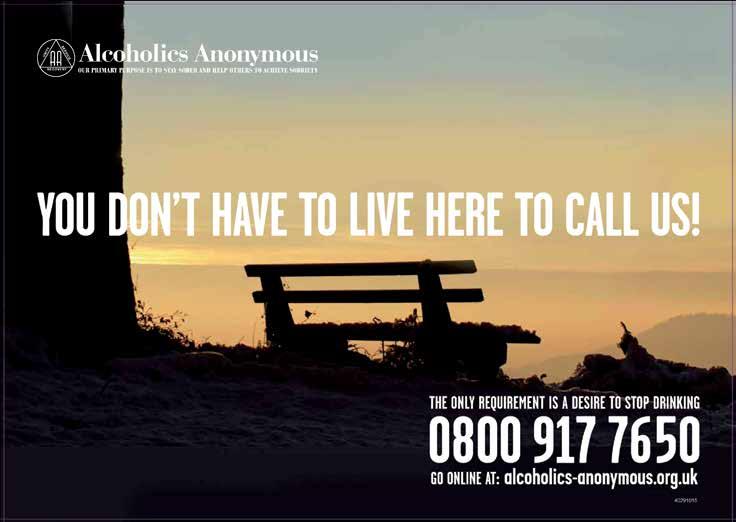
We are here to help!
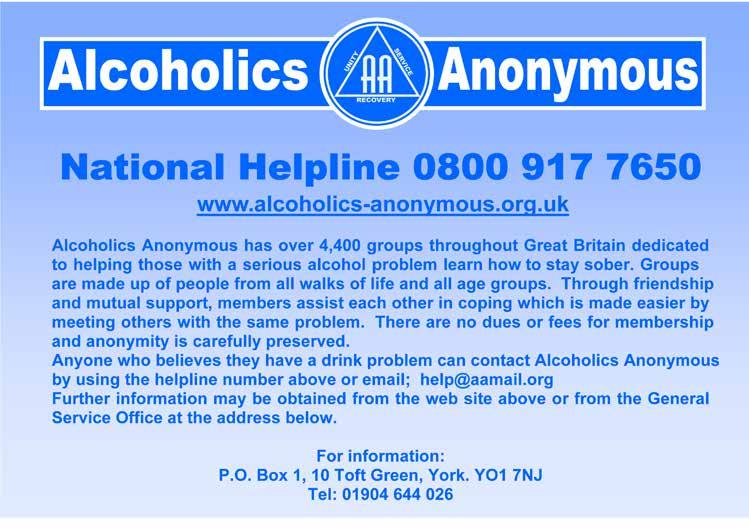
AA is concerned solely with the personal recovery and continued sobriety of individual alcoholics who turn to the Fellowship for help.
AA experience has always been made available freely to all who sought it. Do you want help with a drinking problem?
If alcohol is costing you more than money, then call us today in complete confidence on 0800 9177 650, or email us at help@alcoholics-anonymous.org.uk
“I had a good job, a wonderful family and home…but the lost days and lost peace of mind for my wife was a greater cost. I was a ‘functioning alcoholic’ - I worked well and professionally as a police officer, in several specialist roles and with promotions.
“I hid bottles around the house to drink when my wife was busy…
The next morning was always a panic, to check that the bottles were still hidden.
“My 10 year old daughter succumbed to cancer….my drinking rocketed…I learnt to use drink to numb the pain. Then followed a dark period in my life…extended periods of diagnosed depression and marriage break up. I finally admitted to occupational health that I needed help – the response was supportive and nothing like I expected I was offered a place in re-hab, and introduced to Alcoholics Anonymous.

I am now approaching six years of continuous sobriety. I retired from the Police Service sober after 30 years’ service and now work with others trying to recover from alcoholism”
Former Detective Inspector“My rock bottom came after a weekend lost in four bottles of gin and the following morning I rang AA. I admitted to my wife and my two daughters that I was an alcoholic and they helped me get to my first meeting. I knew at the end of that meeting that I’d found the right place”.
“My wife had left home; I’d been assaulted in the town centre a few days later and hadn’t defended myself for the first time; my emotional life was becoming even more unmanageable. I was forced into accepting that I couldn’t drink safely. Like a blinding glimpse of the obvious, the answer was ‘Don’t Drink!’ How to do it? I became committed to AA...”
Former Superintendent
1,500service personnel and their dependants are taking advantage of more than 200 qualification and over 400 courses by studying with The Open University (OU) - what’s stopping you?
Serving your country doesn’t stop you from expanding your horizons. Our flexible distance-style learning means that you can study whenever, wherever and however you like.
• Use your laptop, tablet and smartphone to access all of your learning material on the go - regardless of where you’re stationed;
• Adapt your study schedule around your existing commitments, shifts and postings to learn at a pace that suits you; and
• Put your downtime to good use with practical, interactive and engaging learning content.
“Studying with the OU was flexible, manageable and interesting, exactly what I was looking for.”
Flight Lt James CoulmanThe cost of enhancing your education shouldn’t be prohibitive - especially not for service personnel. That’s why you can take advantage of:
• The MOD’s Enhanced Learning Credits (ELC) to contribute towards your personal and career development - you’ve earned them, use them;
• The OU's flexible payment options, financial support packages and bursaries - making education affordable; and
• A wide range of certified qualifications that enhance your earning potential, delivering you return on investment.
See what financial support you can access.
You don’t need any previous qualifications or ranking to study with the OU - you just need life experience, and something tells us you have a lot of it.
• Build upon your existing skills and talents to help achieve your future goals - whether that’s lifelong learning, career enhancement or resettlement;
• Learn practical and transferable skills from industry experts and world leaders - increasing your performance and fueling your potential.
“The OU deserves huge credit for enabling me to do this. I doubt there is another institution anywhere that would have taken me from seven O-levels to LSE in five years whilst I was holding down a busy job stretching across the globe.” Mike Niblett
Take a look at our full range of courses and qualifications.
I’VE NEVER WRITTEN AN ESSAY IN MY LIFE We don’t care. With more than 50 years’ of teaching experience, we know how adults learn, and we know how to get the best from you - regardless of how good you think you are at studying.
• Your personal tutor will give you all of the academic guidance and feedback you need to get you back into study and achieving results;
• Our dedicated student support service is always on hand for professional advice on everything from learning methods and career guidance to module choices and IT support; and

• The worldwide OU student community provides support, networks and advice from people just like you.
There are many distance education providers out there - but very few who have been doing it for as long or as well as we have. Take advantage of our 50 years’ experience, expert tutors and company partnerships for: Resettlement - get ready to beat the competition and enter a rewarding career with a well-respected qualification. Career advancementprepare your knowledge and qualifications for your next position in the forces with our range of fully accredited courses.
Personal development - keep your mind active, knowledge up-to-date and interests interesting with our short courses, CPD workshops and postgraduate courses. Dependants - take advantage of the same choice of courses, flexibility and expert teachers to enhance your own career and personal development.

Find out what it’s like to study with us.
Study with someone who’s been doing it longer and better than anyone else. Study with the OU.
Visit www.open.ac.uk/forces for more information.
Stuck in a rut, thinking about resettlement or just wanting to advance your career?
Discover how you can benefit from the OU’s flexible learning styles. >>
I’M NOT AN ACADEMIC You don’t have to study the history of art unless you want to. With more than 200 different qualifications to choose from, we’re here to help improve your skills, develop your knowledge and prepare you for a career in or out of the armed forces.
• Learn practical skills and applicable knowledge from industry-experienced tutors;


• Stretch yourself to achieve more, with an inspiring, challenging and rewarding educational experience; and
• Connect with other learners from different industries, backgrounds and networks - you never know where it will lead you.
“Having a BSc after my name definitely helped me to find a job - in fact I was headhunted by a gas turbine company, and I left the Navy on a Friday and started work on Monday.”
Andy Murray
There is currently an abundance of career opportunities within fire risk assessment industry and with the release of the Fire Sector Federation (FSF) Approved Code of Practice for Fire Risk Assessor Competency in 2020 the need for fire risk assessors to have a qualification is becoming the norm.
Fire Safety Risk Assessment Consultancy Limited (FSRAC Limited) are currently offering a Level 3 Award Qualification in fire risk assessment awarded by Qualifications Network UK. It is possible to attain this qualification within a short period of time, typically less than one month.
The FSF and the fire risk assessment industry promote being a member of a fire safety related Institution and this qualification will enable you
to become join the Institute of Fire Safety Managers (IFSM).
Demonstratable competence is becoming this norm within the fire risk assessment industry and one of the elements of being a competent person is being a reliable and responsible person; having been in the forces you will already be considered to have these qualities.

We have trained (or retrained) fire risk assessors from several industry leading companies including Mitie, Mears, Frazer Group and more.
The Level 3 Award in Fire Risk Assessment is a 5-day classroom course with a short portfolio of work to be completed in your own time afterwards. Completion of both parts of the course will result in a certificate being awarded by the awarding body, QNUK and as we are accredited by the Institute of Fire Safety Mangers (IFSM) are company certificate is also issued with the IFSM accreditation; a further certificate is also awarded by the Institute of Fire Engineers (IFE) for Continual Progressive Development hours.
Courses are delivered in Manchester by David Prince an ex-fire officer, fire safety inspecting officer, fire investigation officer and Nationally Accredited Fire Risk Assessor.
Our training courses are kept up to date with any updates in fire safety legislation included in the course; courses are constantly updated to ensure currency.
David Prince MIFireE, MIFSM, FdSc, Tech IOSH, LCGI, Dip(Ed) Nationally Accredited Fire Risk Assessor Register (NAFRAR) No. 0151 FRACS (Fire Risk Assessor Certification Scheme) No. 73 Member of the UK-AFI (Fire Investigation).
Who is this 5-Day Course For: This course is aimed at those who have a responsibility for undertaking fire risk assessments, reviewing and or implementing the significant findings of a fire risk assessment.
Typically, such persons would be
• Fire Risk Assessors,
• Health and Safety Manager,
Health and Safety Advisor,
Health Safety and Environmental Advisor,
Building Facilities Managers and Facilities Teams,
Managing Agents, • Building Owners,
Fire Alarm Engineers,
• Electrical and Mechanical Engineers.
• Our courses encompass the principles of fire safety risk assessment.
• Delegates will learn how the fire risk assessment process ‘pieces’ together with this course covering all of the necessary basic elements of a fire risk assessment.
• This course contains an update on building cladding types.
• This course aligns to the elements of the ‘Fire Risk Assessment Competency Council Framework
John S. JJS. Limited “Excellent knowledge base and very well presented, a great course for aspiring fire risk assessors”.
Grahame H. “Absolutely brilliant… exactly what I required”. Jayne T. R and R Safety Systems. “Left me wanting more... excellent interaction and practical exercises”
Mark P. MPW Safety Solutions. “Excellent course. Well-
• ‘Fire Risk Assessment
Competency Council Framework’
• Fire Science
• The Regulatory Reform (Fire Safety) Order 2005, (Fire Safety Legislation)
• Building Construction
• Fire Compartmentation (Passive and Active Fire Protection)
• Fire Doors, Final Exit Doors, and Door Security Devices
• Understanding and Calculating Floor Space Factors, Door Widths and Travel Distances.
• Means of Escape in the Built Environment.
• Understanding Escape Times
• Understanding Human Behaviour in Fire Situations
• Understanding Evacuation Strategies.
structured and presented in a clear and logical way… highly recommended”
The course aligns to the Fire Sector Federation (FSF) Approved Code of Practice for Fire Risk Assessor
Competency: Cross Mapping to RQF Level 3, EQF Level 4 or SCQF Level 6.
This course is aimed at fire risk assessor or those wishing to become a fire risk assessor wishing to undertake fire risk assessments of simple premises (as defined in the government guidance documents.
Extract from the FRACC Document: Competency Criteria for Fire Risk Assessors Fire Risk Assessor Competency
Evidence of specialist training, membership of a professional body, and or certification by a third-party certificated body, need an appropriate knowledge of:
• The assessment of risk from fire (Appendix A)
• The applicable Legislation (Appendix B)
• Appropriate Guidance (Appendix C)
• Behaviour of fire in premises (Appendix D)
• Effects of fire on people and behaviour of people in fire situations (Appendix E)
• Means of escape (Appendix F)
• Fire Prevention (Appendix G)
• Fire Protection (Appendix H includes Passive and Active fire protection)
• Management of Fire Safety (Appendix I)
By the end to the course the delegates will*:
• Understand how to assess the risk of fire in the built environment
• Be able to reference
• Fire Alarm systems and BS 5839
• Emergency Escape Lighting and BS 5266
• Emergency Signage
• Firefighting Equipment
• to Fire Safety Management
• Understanding Fire Safety Training and the Legal Responsibilities.
• The Fire Risk Assessment Process.
• Understanding Fire Risk Assessment Significant Findings (Recommended Actions).
• Understanding when to Review the Fire Risk Assessment.
• Risk Reduction and Arson Prevention.
• Using relevant Fire Safety Guidance Documents (Home Office Guides, Approved D Document ‘B’ and BS 9999 are referred to throughout the course).
the Fire Safety Law for England and Wales
• Be able to reference appropriate guidance documents
• Understand the behaviour of fire in the built environment including ignition sources of fire
• Understand the effects of fire on people and human behaviour in fire situations
• Understand means of escape
• Understand fire prevention
• Understand fire protection (Passive fire compartmentation and Active fire systems)
• Understand the management of fire safety in the built environment.
*The course also considers how the delegate will manage their expectations regarding the fire risk assessment process.
The course uses a delegate workbook (the delegate keeps this for future reference), presentations and exercises which are interactively debriefed during the course.
Throughout the course delegates will complete the workbook exercises relevant to each presentation; delegates will complete a ‘mock premises’ fire risk assessment exercise (desktop exercise).
The course is assessable; with a multiple-choice test on the last day and completion of a portfolio of work to be completed within 10 working days of the end of the course.
Level 3 Award in Fire Risk Assessment (Qualification\Ofqual Registration Number 603/2073/4)
We are an ‘Institute of Fire Safety Managers’ (IFSM) ‘Accredited Centre’.
An ‘Certificate of Attendance’ Accredited by FSRAC Limited with ‘The Institute of Fire Safety Managers’ (IFSM) Accreditation.
The Course is also awarded 29 Hours of Continual Professional Development (CPD) with the Institute of Fire Engineers (IFE).
Career Opportunities for serving and retired police officers
5-Days 09.00 Hours to 17:00
Hours, with morning and afternoon breaks and 45 minutes for lunch. This 5-day course includes a light lunch, teas and coffees, soft drinks and light snacks each day.
Those persons retiring from the forces can use their learning credits as payment for the course as we are registered to accept these.
The cost is £1195.00 per person plus VAT (£1434 Including VAT).
Courses are held each month at the same venue. There are a maximum of 12 delegates places per course.
The Training Venue: Training is held in the Manchester Conference Centre in Manchester. The address is, The Manchester Conference Centre located in The Pendulum Hotel, Sackville Street, Manchester. M1 3BB.
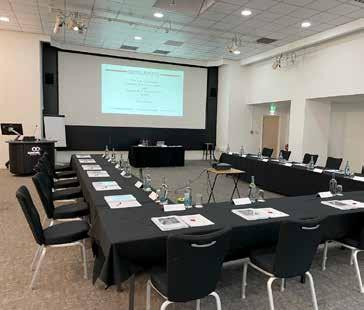
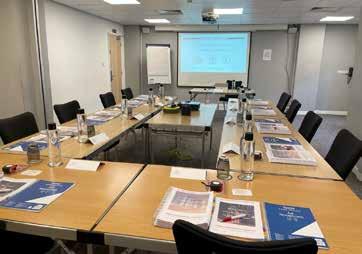
Start Time: 09.00 Hours (Tea and Coffee available each day from 08.30 hours in the training room).
Finish Times: 17.00 hours each day.
The Trainer Training is delivered by David; David is formally a Fire and Rescue Service Officer with 27 years’ experience, David was a warranted ‘Fire Safety Inspecting Officer’, Fire and Rescue Service Qualified Fire Investigation Officer. Since retiring David Prince has delivered Fire Risk Assessment training nationally and has a wide range of experience in delivering such training to all sectors especially to Health and Safety practitioners. David Prince continues to undertake fire risk assessments of a wide range of premises types throughout the UK. David Prince is one of only 73 Nationally Accredited Fire Risk Assessors on the FRACS register and is also listed on the IFSM Register of Fire Risk Assessors (No 151). David Prince also has formal teaching qualifications (Dip Ed) as well as a wide range of ‘Fire and Rescue Service’ fire safety qualifications. As a fire safety practitioner David is aware of current Fire Safety practices. *For training purposes only.
*All courses and course bookings are subject to our terms and conditions which are available on our website www.fireriskconsult.com
Progression Routes to Further Courses: Fire Risk Assessment in Specialised Housing (Sheltered Housing, Extra Care and Supported Living)

we collected ‘Best Franchisee Support’ Silver Award Winner and our Stevenage franchisee, Keith Harrison picked up ‘Franchisee of the Year’ Gold Award Winner in the VFA22 franchise awards, as judged and sponsored by Barclays Bank.
With the capability of multivan expansion, we provide the guidance and support to take your business to the next level.
Already BS AU 242b:2022 compliant, this patented equipment simplifies the repair process of challenging damages competitors must walk away from and activates a faster curing time, so each franchise can carry out repairs more efficiently.
any service-leavers struggle with the return to civilian life and take up franchise ownership in their mission to find a role that continues to fulfil, motivate, and challenge them.
With transferrable skill sets ideally suited to most franchise systems and a proven business model to follow closely, franchise ownership can provide a robust safety net for ex-forces yearning to be their own boss.
Screen Rescue is the UK’s only award-winning franchise providing a wide range of vital, in-demand windscreen and glass repair services to all sectors of the thriving Commercial Automotive Industry, now worth £49bn to the UK economy.
Since 2012, we have become approved suppliers to all main dealership brands from Audi to Volvo gaining an unrivalled reputation for the wide range of windscreen and glass repairs we handle along with the exceptional customer services we deliver.
Our purpose is simple: we repair windscreen and glass damages on a regular and reliable basis rather than replacing them, so that hundreds of our commercial automotive clients continue to make significant savings every day.
These include new and used
car garages, freight, haulage, transport, distribution and logistics carriers as well as school transport, mini-bus and coach hire, and public transport. Civil engineering and construction companies together with local government, essential services and major fleet operators all enjoy the ‘wow!’ factor of our unbeaten repair results.
Screen Rescue provides an excellent opportunity for those seeking the freedom and flexibility of running a van-based franchise from home where the more clients you look after, the more repeat business you carry out; the more you can earn.
The franchise license comes with a large territory designed to deliver the maximum reward for your efforts so you can build a multi-van operation and scale up your franchise in line with your real ambitions.
Full training and award-winning franchisee support is provided in all areas of this franchise business, so no previous experience is required. And the business model is simple to learn; highly profitable and easy to manage. With repeat business and multiple revenue streams, the rewards for hardworking franchisees are unlimited.
There is no better time to join Screen Rescue. In January
We are on a mission to recruit ambitious new franchisees with the drive and energy to be their own boss. If you are ready to become a trusted and valued part of the Commercial Automotive Industry, then a Screen Rescue franchise business could be the right resettlement opportunity for you.
The rewards for ambitious, hardworking franchisees are unlimited. Our Financial Blueprint is designed so that you can draw an income from day one and take additional dividends by year two. As your business scales up, you can expect increased earnings year-on-year.
Our territories are awarded to you, exclusively. Defined by intact postcode areas, they are designed to deliver the maximum reward for your efforts and contain the correct business mix potential for you to scale up operations at your own pace.
The business model is proven to achieve a turnover greater than £75,000 from each fully established operating van.
Unrivalled GQA NVQ & 4M advanced repairs training BSI standards in windscreen repair now take reforms to new levels where working towards British Standards means compliance to a BWSC 4M approach.
Replacing elite GQA NVQ training, franchisees will be trained in 4M standards on its launch.
We’ll help you win new clients and build a thriving repeat business client base. Every day is varied as you provide a full range of vital, advanced windscreen and glass repair solutions from your own fully equipped branded mobile van:
• All stone chip repairs
• Long & short crack repairs
• Glass scratch removal & polishing – 100% distortion free
• Glass graffiti removal repairs
• Headlight polish & full restoration
The franchisors train you in all windscreen and glass repair disciplines, business development, sales and marketing, accounts, and operational processes, so you are fully confident in running all areas of your franchise operation.
Pre-launch social media marketing direct to your lead base is followed
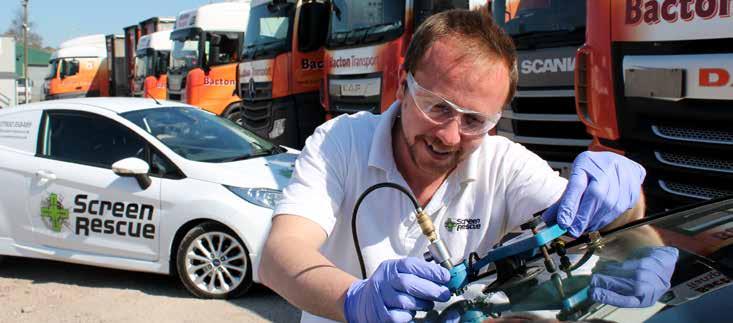
“
From the start, I was attracted to the level of training and ongoing support you get with Screen Rescue, and I could see the scalable potential of the franchise. I had total confidence in the professional way the franchisors assisted me with my business plan and my tailored financial forecast, and found it was a straightforward process to raise the funds I needed for my working capital.
“It was also reassuring to see the way the franchisors handled the legal company set-up with the accountants, which helped take some of the worry out of starting my new franchise as I had never run a substantial business before.
“
All-in-all, it was the one-toone franchisor training, ongoing support, and unlimited guidance I was offered that gave me the extra confidence to proceed.



"I was looking for an opportunity that could allow me to become my own boss after deciding to move away from my management position in the aviation sector, and after reviewing the Screen Rescue business model and carrying out detailed research and due diligence, I was convinced that the market for their services was significant, strong and stable. The support I received from the franchisors during the application process was excellent, guiding me in production of the business plan, sales forecasts and cashflow. Raising the funding I required was also straightforward with multiple entities looking to support my business financing. All of this meant I was in a position to start trading within my protected postcode area within a very short time period. "
with a tactical in-territory ‘buddy system’ launch, led by franchisor, Jaime Hilario. This strategy fasttracks you into business giving your franchise the best possible start.
No new business is an overnight success, so we’re in this together throughout your franchise term. You’ll be offered a FOC renewable option every decade (T&CS apply) or if you choose, we’ll help you sell your franchise asset later down the line.
You’ll benefit from regular in-territory visits and one-onone guidance direct from both franchisors to help accelerate your business growth; providing you with ongoing support when and where you need it as your franchise business grows.

Investing in this franchise provides you with a wide range of daily support services to maximise your full potential. You’ll be awarded full access to our head office award-winning franchisee support team. Think of them as your own staffed office.
From a strong franchise background of 23 years, we understand the new cashflow challenges franchisees face. Our award-winning franchisee support team manage your daily invoicing and payment collections so you can focus on your business.
Our award-winning franchisee support team identify and collate your leads from live online government data. Every lead is credit-checked, scored and evaluated to meet tactical launch, marketing and ongoing business development strategies.
Screen Rescue are full members of the QFA. Membership is subject to passing a stringent accreditation process and demonstrates a total commitment from the Franchisors to be ethical in their support of incoming and existing Franchisee’s.

The QFA, does not endorse any specific franchise brand, but accreditation does give some comfort to potential franchisees when making their own evaluations.



Located on the picturesque Monmouth Beach in stunning Lyme Regis, Dorset, the world-renowned Boat Building Academy has been training men and women to build boats to the highest standard for over 25 years.

Our flagship 40-week Boat Building course has produced a generation of skilled craftspeople who have excelled in all areas of the marine industry in the UK and beyond. Students come to us from all walks of life: from school leavers just starting their careers to those looking to retrain from established professions – all working together for the shared goal of learning how to build boats.
However, there is much more to the Academy than boat building. In recent years, the Academy has earned prominence for our popular 12-week Furniture Making course. Based on the same winning philosophy and ethos as our boat building

training, the course delivers a solid foundation in woodworking to aspiring makers - ready for whichever path they take next.
For those unable to join us for our ‘longer’ courses, we run a comprehensive programme of 2 to 5-day short courses in most aspects of boat building, woodworking and more: Learn renovation and finishing techniques with master boat builder Colin Henwood; get the hang of dovetail joints in our Woodworking Skills II course; discover the art of sail making; gain a foundation working with glass reinforced plastic (GRP). New for 2023! A 3-day Routing course, covering techniques, jigs and the safe use of routers in the workshop.
For further information and how to apply, go to www.boatbuildingacademy. com. Alternatively, you can speak to Janine or Fabiana in the office on (+44) 01297 445545 or email office@ boatbuildingacademy.com

career in travel
Some of the UK’s most successful travel consultants are former police men and women. Find out how they switched careers and how you could do it too.
Former detective sergeant Colman Coynes spent 25 years tackling crimes in West Yorkshire. So it’s not surprising he can interview anyone and find out exactly what they want from a holiday and ensure that they get it.
Having decided to switch careers and open a travel business in 2013 with his wife Rachael, also a former police officer, the couple haven’t looked back, growing their client base from around 100 to 700 people, selling over £5 million in

holidays and being nominated for prestigious travel industry awards.
The couple run the Not Just Travel agent (part of Hays Travel) franchise Jetset, from an office in their Huddersfield garden but are adamant that the career change is not just about the money, but the lifestyle.
“The travel business was an attractive proposition,” says Colman who has been lucky enough to visit the USA, Barbados, Barcelona, Thailand and Greece as part of educational
trips with the business.
“But I also love being my own boss,” he adds, explaining that as they can work from anywhere, he and his wife have managed to spend much more time together, and take a four-week holiday to Australia, while still securing bookings.
But why did the couple choose a franchise?
“I did a lot of research, looking at all the travel businesses out there. I was attracted to a franchise as I didn’t want to start a business from scratch” says Colman.
The Travel Franchise caught his eye as a company that was “fresh and new and forwardthinking”, and most importantly, franchisees don’t need to have a background in travel. The only requisite is that new recruits undertake a five-day intensive training course which teaches them how to use the necessary agent booking systems, as well as an introduction to all the hundreds of different holidays they can sell.
Following basic training, every business owner is appointed a Business Development Manager (BDM) who has years of travel experience and can help iron out any problems, establish goals and help achieve personal targets.
Faye Ford is another successful travel consultant who recently switched careers
and joined The Travel Franchise in 2021 after over 17 years in the police. She runs her travel business alongside her part-time job as a wedding photographer and attributes her success (and happiness) to hard work and the training and support given by The Travel Franchise.
“Life’s too short to be unhappy and stuck in something feeling miserable. Now I’ve got this brilliant business that I enjoy coming to work in every day. Everything to do with travel and with The Travel Franchise is really interesting and positive.”
While some franchisees start full time, others become a parttime personal travel consultant to earn an extra income to top up a pension. Either way, the secret to success, according to travel consultant Sarah Watts, another former police officer, is the ability to enjoy researching and talking about holidays.
Sarah is quick to point out that she doesn’t see herself as a travel agent, but as a personal consultant who runs a travel business. “If you just view it as being a travel agent and booking a holiday, it’s very two dimensional. View your business – and what you do – as helping people have amazing experiences instead. We just happen to do it through holidays. There’s a real difference.”



Can I really become a travel consultant in under a week?
Yes. The Travel Franchise is the number one company in the UK for people with zero travel experience who want to buy a franchise and run a thriving home-based travel agency. After a five-day induction, you’ll become a Not Just Travel consultant, book holidays, choose your own hours, run your own business and be your own boss.
Prices start from just £2,995 +VAT.
And I don’t need any experience in the travel industry?
Correct. The majority of Not Just Travel consultants have never worked in the travel industry before and two thirds have never worked for themselves either. A further two thirds start their journey part time, so they can keep their existing income until their business grows.
Does The Travel Franchise offer ongoing training and support?

Yes, after the initial five-day induction consultants are allocated
a business development manager (BDM) and enjoy support from the Not Just Travel operations team. Consultants also have the chance to train with Not Just Travel partners and suppliers who provide everything from package holidays to golf, ski and cruising.


The Travel Franchise/Not Just Travel are part of the Hays Travel Independence Group with over £2m worth of travel buying power, enabling you to sell a vast variety of escapes at competitive prices.
As a Not Just Travel consultant, you’ll sell holidays - all protected by the industry body of ABTA and the ATOL scheme - from over 450 tour operators.
As an agent, you will always earn commission – a percentage of the overall cost – on every type of travel that you sell, whether that’s a flight, hotel or cruise, typically after the trip has taken place. One of our new recruits secured a £1 million booking in just three months. You do the maths.
Yes. The Travel Franchise/Not Just Travel run world-class international
retreats, ski and golf trips and host two annual conferences in the UK where you can establish long-standing professional relationships and friends. Agents can also join educational trips all around the world, hosted by our travel partners.
The Ministry of Defence Police delivers a specialist armed policing service, to protect the nation’s defences and national infrastructure.




From the Scottish Highlands to the South West coast, MDP officers serve at locations throughout the UK.


A diverse workforce is essential to our success and we welcome people from different backgrounds and experiences, who represent the communities we serve.
